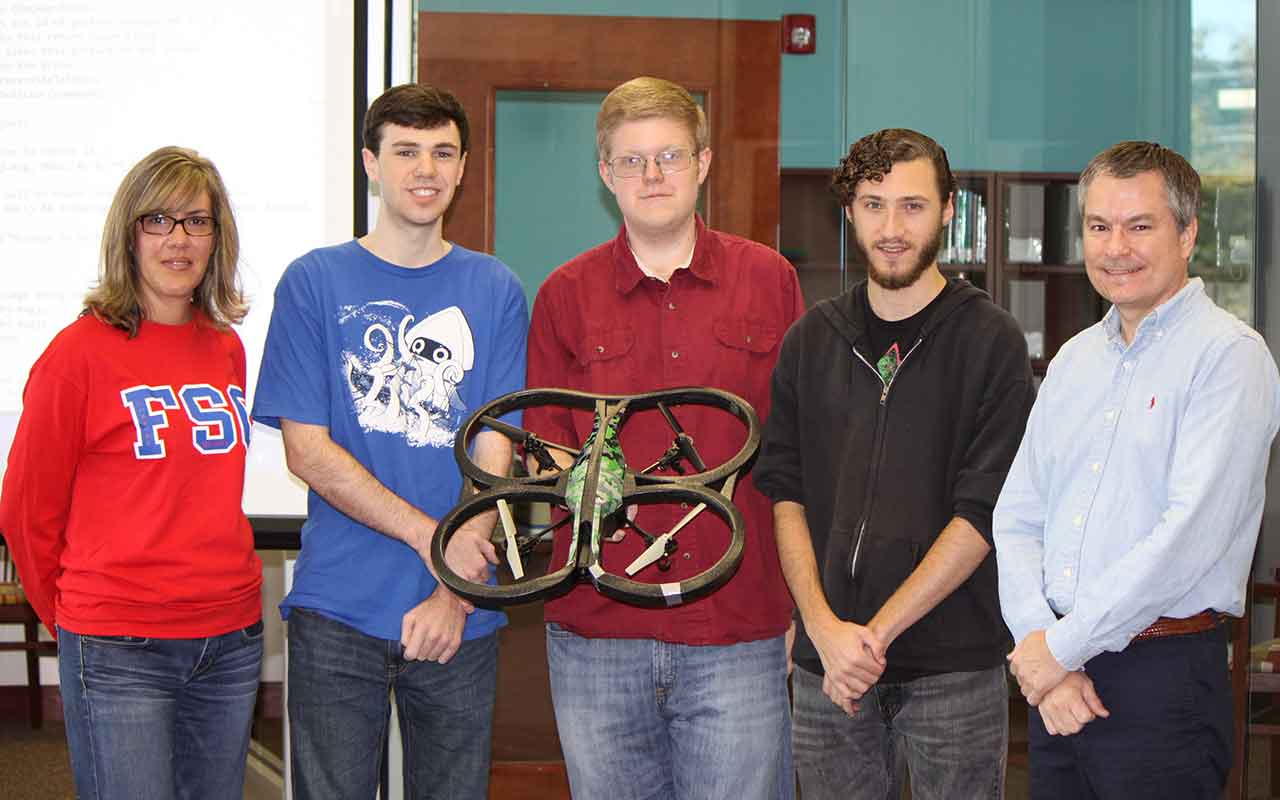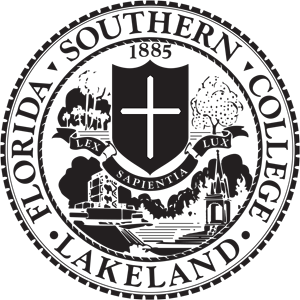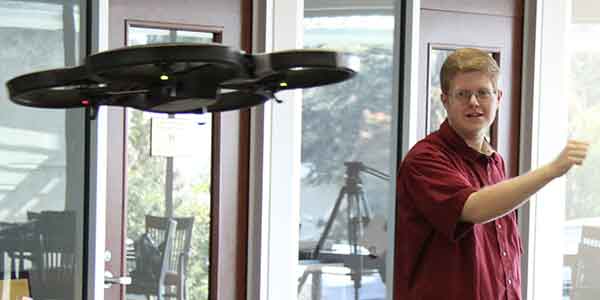
Computer Science Team Makes Research Soar
Dec 19, 2014

Pick a department at Florida Southern. Any department. Investigate what’s trending in that field. Then, take that avid curiosity and convey it to one of our expert professors who immediately will provide you with the tools and resources needed to pioneer further exploration into this trending interest.
Just ask computer science major Jordan Finney, ‘16, who took his inquisitiveness about small, unmanned aircrafts, called drones, to Dr. David Mathias in the Mathematics and Computer Science department. They discussed researching drones and possibly constructing one from scratch. It wasn’t long before a team of one student turned into a currently growing team of 14.
“Dr. Mathias had taken on advising for the extracurricular program, Air Mocs, Florida Southern’s autonomous drone research team.” Finney said. “Dr. Mathias takes an involved approach when it comes to student learning and development, going far beyond the classroom to get to know his students and help them achieve their goals.”
The research areas that the students in Air Mocs explore include computer vision, drone automation, computer learning, 3D mapping and other emerging fields of computer science. The team is comprised of anyone of any major who is interested in being part of an exciting and challenging research team, from beginners to experienced programmers.
Currently, the Department has several different quad-copters, ranging in size from tiny to large. Together with Dr. Mathias, students work as a team to write programs, which allow them to control the drones using hand-motions.

The work with drones involves technical challenges such as interfacing disparate software libraries and working with various development platforms – practices that certainly help prepare students for their careers.
“When it comes to programming, it’s cool to see my work in action,” said Air Mocs member and Hollingsworth Scholar, Vincent Ragusa, ’17, whose career goal after graduation is to work with artificial intelligence. “As a programmer, I typically only see my work coming to life on a screen. With drones, we still have to use a screen to do its programming, but it’s nice to see it physically do what you made it do.”
The “physical” aspect is exciting not only to many students, but also for military operators, scientists, researchers, and even larger businesses like Amazon, that see this as an opportunity for a more efficient and convenient customer service.
“Real-world applications for unmanned aerial vehicles are endless,” said Mathias. “Everyone has heard that Amazon and Dominos want to use drones to make deliveries, and certainly there will be many commercial uses once the regulatory framework is ironed out. But some of the more interesting ideas are non-commercial. In Europe, there has been work on using a series of drones to create ad hoc Wi-Fi networks in mountainous areas to help facilitate rescue after avalanches.”
According to Mathias, “an American research group has done work in having drones cooperate, autonomously, to achieve a goal such as constructing a model. In South America, a drone was used recently to record the damage to a UN World Heritage site caused by protesters. Technologies explored and developed by researchers may one day find their way into products that we can’t yet imagine. It’s a fascinating field and our students will have the opportunity to work on these or similar problems.”
In the US, non-commercial drone use is currently unregulated, but with the increase of air space that these mini-flying machines occupy, the Federal Aviation Administration (FAA) is on a close watch and recently banned drone use for most businesses. Companies such as Amazon that are eager to test drones for future services to its customers are constantly seeking permission.
But right now, the student members of Air Mocs, find enjoyment in the exploration of this ‘soaring’ new-age quad-propeller in a positively safe way, and Mathias is hopeful that students will continue to create and program drones whose possible goal would be to work with the Citrus department and fly over the groves on campus, providing an interdisciplinary approach to academia, which Florida Southern encourages.
“In addition to agricultural applications, which is just an idea at this point,” explained Mathias, “we are considering problems such as interactions between drones and swarming behavior (with numerous drones), obstacle avoidance, and interior navigation (where no GPS signal is available).”
And to think this initiative was born out of the thoughts and interests of a junior on campus, whose ideas were made possible by a supporting faculty member.
“Dr. Mathias is always willing to help students explore their interests and guide them,” affirmed Finney.
So if you have a passion. Talk to your professor about it. Who knows what a thought at Florida Southern can lead to?